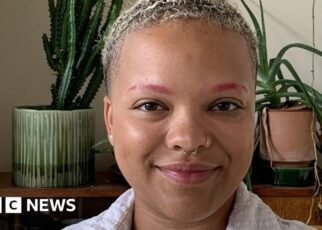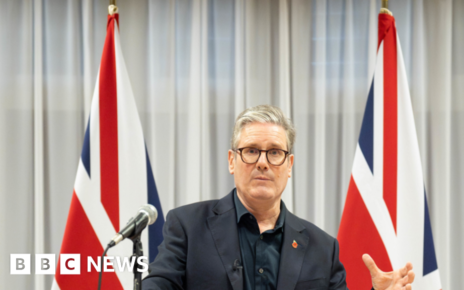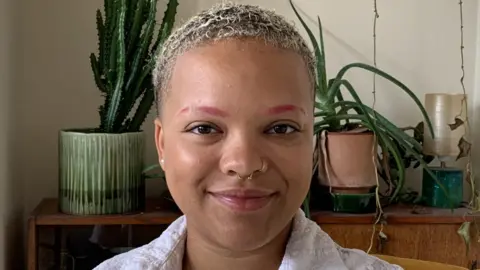 Tracey Langford / BBC
Tracey Langford / BBCThe compensation that egg donors receive will rise for the first time in over a decade in the UK, but people should not donate purely for the money, the fertility regulator has warned.
It is illegal to pay someone for their eggs in the UK but compensation is paid to cover expenses. This will rise from £750 to £986 on 1 October, partly to reflect price rises.
The UK currently has a shortage of egg donors, particularly from black and ethnic minority backgrounds, the regulator said.
Yasmin Sharman was inspired to donate for the first time aged 18. “I realised there was a lack of people of colour donors and that upset me… and so that made me want to do it again,” they said.
“I identify as a non-binary lesbian so I already had the thought in my head of I may have to go through different routes to have children,” they explained.
Now aged 26, Mx Sharman has donated three times and shares their egg donation journey on TikTok. They said a lot of the comments focused on the compensation not being considered enough.
“If you raise it too much there is a risk there that people will do it solely for the money, which puts lower income people more at risk,” they said.
The compensation will rise for the first time since 2011 partly due to inflation, said the Human Fertilisation and Embryology Authority (HFEA).
“It’s going up to just under £1,000 which the HFEA felt was a right balance between compensating people for their time but really recognising that, in the UK, egg donation is an altruistic act,” said Clare Ettinghausen, director of strategy and corporate affairs at the HFEA.
Donating purely for the money should come with a “clear health warning” as there are some dangers, added Ms Ettinghausen.
“It’s not without risks. You go through the first part of IVF treatment. It can be uncomfortable,” she added.
Donors are also made aware that any children born from their eggs can try to contact them once they turn 18.
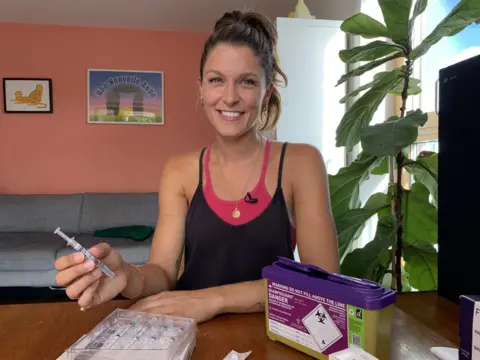 Tracey Langford / BBC
Tracey Langford / BBCEgg donor shortage
Charlotte Holmes, 35, also shares her egg donor experience on social media.
She is currently undergoing the donation process for a second time for a couple who contacted her online.
“I give blood. I’ve donated my hair. It’s something for me that feels in excess especially when I don’t want children,” Ms Holmes said.
“The first time I donated was last year. I donated to the London Egg Bank and this year after a couple reached out to me on Instagram, I’m donating to them.”
Ms Holmes told the BBC she will not receive any extra money from the couple – only the current £750 compensation from the clinic.
According to data from the HFEA, egg donation has remained largely the same since the 2011 compensation rise but demand for eggs has increased.
Ms Holmes doesn’t think people should donate purely for financial purposes but hopes the increase in compensation can help address the current donor shortage.
“Does the additional £250 make a huge amount of difference? Probably not,” she said.
“If it opens the door to other women going ‘oh £1,000’, is that a good thing? I think it is because we’re desperate for egg donors,” she added.
This is a sentiment shared by Belle Brittle, 24, who donated her eggs last year.
“It may entice people to donate their eggs, albeit for financial reasons, but if it works to encourage people to at least think about donating, then it’s important,” she said.
“It’s an egg donation process, not an egg sales market.”
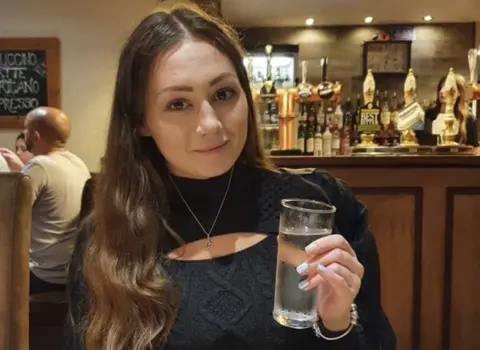
Some clinics hope the compensation rise will help to tackle the egg donor shortage.
“Increasing the compensation for egg donors in the UK to £986 is justified as it better reflects the time, effort, and medical risks involved in the donation and helps address the current donor shortage,” said Dr Thanos Papathanasiou, chief executive and medical director at Bourn Hall fertility clinic.
“The donation process still requires genuine personal commitment, so increasing the compensation would not undermine the altruistic motivations behind egg donation but provide recognition of the donor’s good will.”
All egg donors are offered counselling by clinics and have to go through several medical tests before they can donate.
In most cases you need to be over 18 and under 36 to donate.
Approved donors can go through up to 10 rounds of donations but more than 10 children could be born from the donations if several eggs are used by the same family.
“Really understand that it’s not something you do quickly and then it’s over,” Yasmin Sharman said.
“In 18 years, there is the possibility of a human being reaching out and contacting you.”
